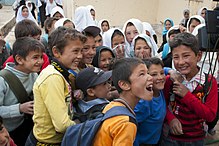Hazara ethnic group

Ethnic Hazara school children in Bamyan, 2012
|
|
| Total population | |
|---|---|
| c. 7–8 million | |
| Regions with significant populations | |
|
|
~2,300,000 to ~3,000,000 (7-9%) |
|
|
900,000. Some ~ 40,000 Afghan citizens of Hazara descent in Pakistan (2005) |
|
|
500,000 |
|
|
130,000 |
|
|
18,000 (2014) |
|
|
4,300 |
|
|
3,800 |
| Languages | |
| Hazaragi and Dari (eastern varieties of Persian) | |
| Religion | |
| Shia Islam (Twelver and Ismaili), with a Sunni minority (see Aimaq Hazara) | |
| Related ethnic groups | |
| Mongolian peoples | |
4,300
3,800
The Hazaras (Hazaragi: آزاره) are an ethnic group native to the region of Hazarajat in central Afghanistan, speaking the Hazaragi variant of Dari, itself an eastern variety of Persian and one of the two official languages of Afghanistan.
They are overwhelmingly Twelver Shia Muslims and make up the third largest ethnic group in Afghanistan. They also make up a significant minority group in the neighboring Pakistan, with a population of over 650,000–900,000, largely living in the region of Quetta.
Babur, founder of the Mughal Empire in the early 16th century, records the name Hazara in his autobiography. He referred to the populace of a region called Hazaristan, located west of the Kabulistan region, north of Ghazna, and southwest of Ghor.
The conventional theory is that the name Hazara derives from the Persian word for "thousand" (هزار hezār). It may be the translation of the Mongol word ming (or minggan), a military unit of 1,000 soldiers at the time of Genghis Khan. With time, the term Hazar could have been substituted for the Mongol word and now stands for the group of people.
...
Wikipedia
